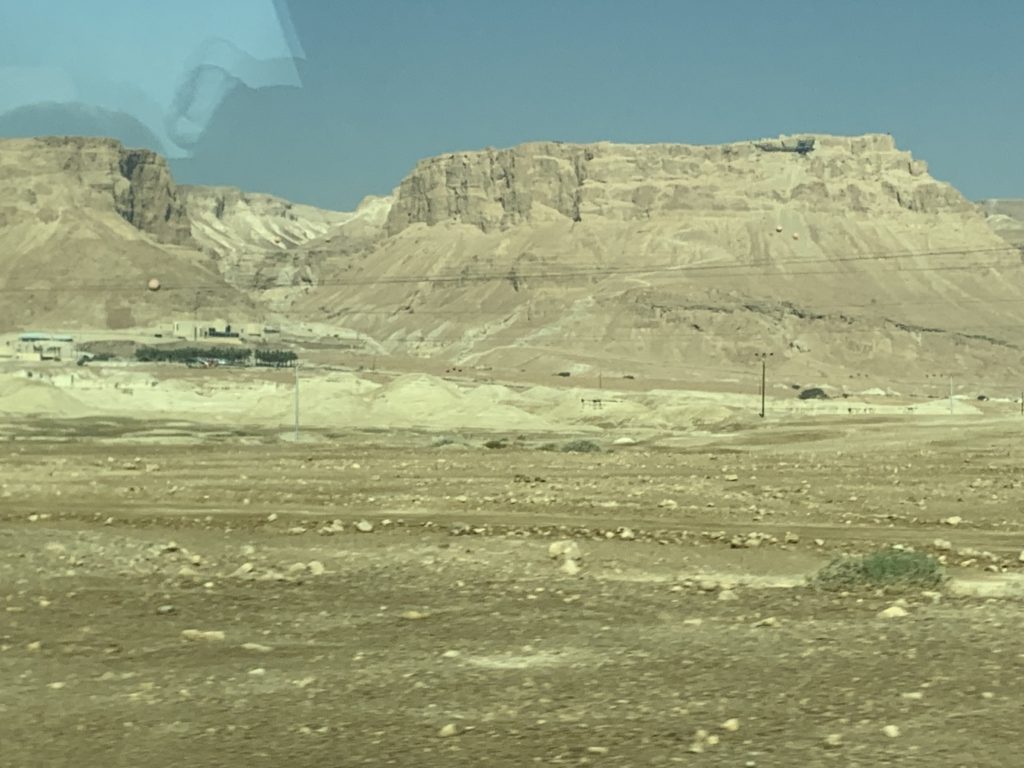“At once the Spirit sent Him out to the wilderness.” (Mark 1:12 NIV)
I suppose I’ve been thinking about wilderness since we first drove into the Negev (southern Judean wilderness) ten days ago. I had expected bleak, but my expectations hadn’t prepared me for the reality of it’s utter isolation. Miles and miles of empty dirt and rock met my gaze. It is a wasteland, entirely absent of anything green, with the infrequent exception of a wadi or two – an oasis miraculously sustained by some unseen underground spring. The Negev is hot, arid, dusty and cloudless. The sun relentlessly beats down on the red-orange rocks, yet it’s absence at night sends the temperatures plummeting. I can’t imagine surviving more than a few hours in the Negev’s vicious grip without a full water bottle and shade, yet this is where scholars believe our Savior was sent by the Spirit and sustained for forty days without drop or bite.

It’s easy for us as Christians to consider our wilderness seasons as punishment, as long hard stretches of temptation and trial. Honestly, that was my thought as I edged into the Negev from the relative safety of our tour bus; “Why would You willingly send Your Son here?” It had never occurred to me that the Father sends His children into seasons of solitude out of deepest love and jealousy for our affections.
In her book, Strengthening the Soul of Your Leadership, Ruth Haley Barton likened our lives to a jar of water, rocks and dirt. The faster we move, the fuller the jar, the more we are shaken. The contents swirl and co-mingle. It’s difficult to determine what is essential, what is valuable and what is simply excess. Just as a jar of muddy water left on a shelf settles, so our soul settles when it’s given opportunity to be left alone with our Creator. Only in stillness can we sort out a settled jar; we can remove the things that cloud our purpose. The Spirit will surely assist us in this process.

Ruth writes: “An essential discipline for leaders is to craft times of quiet in which we allow God to show us things we might otherwise miss. We need time for the chaos in our soul to settle so we can turn aside and look at the great sights in our own life and seek understanding about what they mean.”
Wow. When my wilderness season began, the chaos in my soul was at an all-time high. Love called me into isolation; to this arid, quiet place of self-settling. We tend to see the wilderness as punitive, but the lens of heaven reveals it as restorative. It’s a place where our soul can be reset to factory settings. Jesus did not hate His desert days, He did not resent His soul solitude in the empty Negev. No, quite the opposite, He treasured His season of alone with the Father, He craved the simplicity found in the desert and He returned there (at least in mindset) often. When Jesus comes off His desert days, His ministry ignites but before the first chapter concludes, He’s already retreated again to a soul setting place.
“Very early in the morning; while it was still dark, Jesus got up, let the house and went off to a solitary place, where He prayed.” (Mark 1:35 NIV)
I’m awakening to the truth that my own wilderness. My un-requested time-out from ministry was actually an intentional, extravagant gift from our loving Father. He has set me aside to settle my soul. More than that, He’s supernaturally sustained us in a barren land for four full months. I can see clearly now, why love calls us to the isolated landscapes where intimacy and absolute trust bloom freely.
“My beloved spoke to me and said, “Arise my beautiful one, come with Me.” (Song of Songs 2:10 NIV)
Dear Lord, thank You for loving us enough to call us into vacant spaces where our souls can settle. Help us see the wilderness as restorative rather than punitive. Thanking You for meeting our needs in the desert stretches. Help us learn to love it enough to
return to our isolation often. Amen.